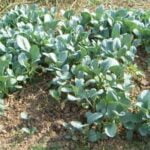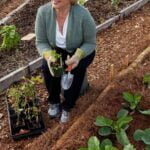Bifen is a commonly used insecticide in gardening and pest control, but is it safe for vegetable gardens? In this article, we will explore the safety of using Bifen in vegetable gardens and discuss the potential risks and considerations associated with its use.
As gardeners, we often rely on insecticides to protect our precious plants from pests that can ravage our vegetable gardens. However, ensuring the safety of these insecticides is crucial, especially when it comes to growing vegetables that we consume.
Understanding the different types of insecticides available in the market and their potential risks is essential for maintaining a safe and healthy environment for both plants and humans. Moreover, it allows us to make informed choices when selecting an insecticide for our vegetable gardens.
In this comprehensive guide, we will examine the safety profile of Bifen specifically. We will explore its active ingredients, formulation, studies conducted on its safety in vegetable gardens, and any regulations or restrictions that may be in place regarding its usage. By gaining a deeper understanding of Bifen’s safety profile, we can ensure that our vegetable gardens thrive without compromising our health or the environment.
Understanding the different types of insecticides and their potential risks
In order to make an informed decision about using Bifen in your vegetable garden, it is important to understand the different types of insecticides available in the market and their potential risks. There are several categories of insecticides commonly used in gardening, each with its own set of properties and risks.
Organic Insecticides
- These insecticides contain natural ingredients derived from plants, minerals, or other organic sources.
- Examples include neem oil, pyrethrin, and diatomaceous earth.
- Organic insecticides are generally considered safer for use in vegetable gardens compared to synthetic ones due to their lower toxicity levels.
- However, they may still pose some risks if ingested or exposed to humans or animals.
Synthetic Insecticides
- Synthetic insecticides are chemical compounds formulated specifically to target and kill insects.
- Examples include imidacloprid, bifenthrin, and malathion.
- These insecticides often have higher toxicity levels compared to organic ones.
- They may pose risks to human health and can have adverse effects on beneficial insects, such as bees and butterflies.
Biopesticides
- Biopesticides are derived from naturally occurring microorganisms or substances found in nature.
- They work by targeting specific pests without harming beneficial insects or the environment.
- Examples include Bacillus thuringiensis (Bt) and spinosad.
- Biopesticides are considered a relatively safe option for pest control in vegetable gardens.
It’s important to note that regardless of the type of insecticide you choose, there will always be some level of risk involved. The key is to understand these risks and take appropriate precautions when using any insecticide in your vegetable garden. Always read the label instructions carefully and follow them explicitly to minimize risks to yourself, others, and the environment.
By understanding the different types of insecticides available, you can make an informed decision about whether Bifen is the right choice for your vegetable garden. In the next section, we will delve into the safety profile of Bifen itself, exploring its active ingredients, formulation, and any regulations or restrictions surrounding its usage in vegetable gardens.
Examining the safety profile of Bifen
Bifen, a commonly used insecticide in gardening and pest control, is often chosen for its effectiveness in controlling a wide range of pests. However, it is important to examine the safety profile of Bifen before using it in vegetable gardens to ensure the health and well-being of both humans and plants.
One key aspect to consider when examining the safety profile of Bifen is its active ingredients and formulation. Bifen contains the active ingredient bifenthrin, which belongs to the synthetic pyrethroid class of insecticides. This ingredient is highly effective against various pests but also carries some potential risks. It is crucial to understand how bifenthrin works and how it may interact with your garden ecosystem.
Several studies and research have been conducted on the safety of Bifen in vegetable gardens. These studies have primarily focused on assessing the impact of bifenthrin on human health, animal exposure, environmental toxicity, and residue levels on plants. Findings suggest that when used according to label instructions, Bifen poses minimal risks to humans or animals when properly applied. However, caution must still be exercised by following recommended dosage rates and application methods.
To provide users with guidance on proper use, there are regulations and restrictions on Bifen usage in vegetable gardens that should be considered. Always check local regulations or consult with extension offices for specific guidelines regarding the use of Bifen in your area. Additionally, familiarize yourself with any precautions or warnings mentioned on product labels before applying Bifen in your vegetable garden.
Examining the safety profile of Bifen is an essential step towards making an informed decision about its usage in vegetable gardens. While it has proven effective against pests, understanding its potential risks will help you take necessary precautions for safe application. By following label instructions, considering local regulations, and being aware of potential hazards, you can minimize any adverse effects while still benefiting from using this insecticide.
| Key Points | Details |
|---|---|
| Active Ingredient | Bifenthrin |
| Formulation | Synthetic pyrethroid insecticide |
| Safety Findings | – Minimal risks to humans and animals when properly applied
|
| Regulations and Restrictions | – Check local regulations or consult with extension offices for specific guidelines
|
Potential risks and considerations of using Bifen in vegetable gardens
Potential risks and hazards
When considering the use of Bifen in vegetable gardens, it is important to be aware of the potential risks and hazards associated with this insecticide. Bifen contains active ingredients that are effective in controlling pests, but they can also pose certain risks when used improperly or in high concentrations.
One potential risk is human and animal exposure. It is crucial to handle Bifen with care and follow safety guidelines to minimize the risk of accidental ingestion or contact with skin or eyes. The use of personal protective equipment, such as gloves and goggles, is recommended when handling or applying Bifen. Additionally, it is advisable to keep children and pets away from treated areas until the product has dried.
Another consideration is the potential environmental impact that Bifen may have. While it can effectively control pests, it may also harm beneficial insects such as bees and butterflies, which play a crucial role in pollination. To mitigate this risk, it is recommended to apply Bifen during times when pollinators are less active, such as early morning or late evening.
Moreover, there is a possibility of plant toxicity if Bifen is not used according to label instructions. Overuse or improper application may result in damage to vegetable plants or contamination of edible parts. It is important to read and follow the instructions on the product label carefully to ensure it is applied at the correct dosage and frequency.
Environmental considerations
Considerations for environmental impact go beyond harm to beneficial insects; users must also be aware that excess runoff could contaminate water sources if not managed properly. When applying Bifen near water bodies or areas with surrounding vegetation, precautions should be taken to prevent direct contact or overspray into these sensitive areas. This includes using barrier methods such as plastic sheeting to protect nearby plants or using a sprayer with low drift potential.
It should also be noted that certain vegetables may be more susceptible to Bifen than others. Some vegetables, such as tomatoes and cucumbers, have been found to be less tolerant of certain insecticides, including Bifen. To minimize the risk of plant damage, it is recommended to conduct a small test application on a few plants before treating the entire vegetable garden.
Integrated pest management approach
While some risks and considerations exist when using Bifen in vegetable gardens, it is important to explore alternative pest control methods and adopt an integrated pest management (IPM) approach. IPM focuses on minimizing reliance on chemical insecticides by incorporating various strategies such as crop rotation, natural predators, physical barriers, and cultural practices.
By implementing IPM techniques alongside the judicious use of insecticides like Bifen, gardeners can reduce their environmental impact while effectively managing pests. Regular monitoring of plants for signs of infestation and early intervention can also help limit the need for broad-spectrum insecticides like Bifen.
Best practices for using Bifen in vegetable gardens
Guidelines for Safe Application
When using Bifen in your vegetable garden, it is important to follow specific guidelines to ensure the safety of both yourself and your plants. Here are some best practices for using Bifen in vegetable gardens:
- Read and Follow Label Instructions: Before using Bifen, carefully read the product label instructions. The label provides important information on proper handling, application rates, timing, and safety precautions. Following these instructions will help you use Bifen effectively and minimize any potential risks.
- Wear Protective Clothing and Equipment: When applying Bifen, wear long sleeves, long pants, closed-toe shoes, gloves, and eye protection to protect yourself from direct exposure. These precautions will help prevent skin contact and inhalation of the insecticide.
- Choose the Right Timing: Apply Bifen when weather conditions are calm to minimize drift and avoid application during windy periods. It is recommended to apply Bifen early in the morning or during the late afternoon when bees and other beneficial insects are less active to reduce their exposure.
- Proper Mixing and Application: Follow the specified mixing ratios recommended on the product label to ensure accurate dilution of Bifen in water. Use a sprayer or applicator that allows for even distribution of the insecticide over your vegetable plants.
- Target Specific Pests: Identify the pests you are targeting in your vegetable garden before applying Bifen. This will help you determine the appropriate area to treat while minimizing unnecessary exposure to non-target pests, pollinators, or beneficial insects.
Precautions for Human and Environmental Safety
While Bifen is considered relatively safe for use in vegetable gardens when used according to label instructions, there are still precautions that should be taken:
- Minimize Exposure to Edible Parts: Avoid spraying directly onto edible parts of plants whenever possible. Use caution when treating crops such as lettuce or other leafy greens, as direct contact with the edible portion can increase the risk of ingestion.
- Observe Pre-Harvest Intervals (PHIs): PHIs specify the number of days that need to pass between the last application of Bifen and when you can safely harvest your vegetables. Adhering to these intervals is essential to avoid any chemicals being present on your food during consumption.
- Store Safely: Ensure that unused Bifen and any mixing or application equipment are stored securely out of reach of children and pets. Follow local regulations for disposal of empty containers and unused product.
Integrated Pest Management
In addition to using Bifen, it is important to consider incorporating integrated pest management (IPM) practices in your vegetable garden. IPM focuses on preventing pest problems through a combination of techniques such as crop rotation, maintaining plant health, introducing beneficial insects, and practicing good sanitation.
By implementing IPM strategies, you can reduce the reliance on chemical insecticides like Bifen, which ultimately promotes a healthier and more balanced ecosystem in your vegetable garden.
Remember, while Bifen can be a useful tool for managing pests in vegetable gardens, it is crucial to follow best practices for safe usage and consider alternative methods whenever possible. By making informed decisions about pest control in your vegetable garden, you can cultivate healthy plants while minimizing potential risks to yourself and the environment.
Alternative pest control methods for vegetable gardens
Vegetable gardeners who are concerned about the safety of using Bifen in their gardens have several alternative pest control methods to consider. These methods offer effective and environmentally-friendly ways to manage pests without relying on chemical insecticides. Here are some recommended alternatives:
- Natural repellents: Many pests can be deterred by natural repellents such as garlic, neem oil, and soap sprays. These repellents can be made at home using readily available ingredients and can help keep pests away from your vegetables.
- Companion planting: Planting certain flowers and herbs alongside vegetables can help repel pests naturally. For example, marigolds can deter aphids and nematodes, while basil can repel mosquitoes and flies. Additionally, attracting beneficial insects like ladybugs and lacewings through companion planting can help control harmful pests.
- Biological controls: Introducing beneficial insects or organisms into the garden can provide long-term pest control. For example, ladybugs feed on aphids, while praying mantises prey on a variety of garden pests. Nematodes can also be used to combat soil-dwelling pests.
- Physical barriers: Creating physical barriers around your vegetable garden can prevent pests from accessing your plants. This includes installing fences or netting to keep out larger animals like rabbits or deer, as well as using row covers to protect against flying insects.
While these alternative pest control methods may require additional effort compared to using chemical insecticides like Bifen, they offer a more sustainable approach to managing pests in vegetable gardens. Integrated Pest Management (IPM) techniques that combine these alternative methods with cultural practices such as regular weeding and proper plant spacing can greatly reduce the need for chemical interventions.
It is essential for vegetable gardeners to weigh the potential risks and benefits of different pest control options before making a decision for their gardens. By exploring these alternative methods and understanding how they can be implemented, gardeners can make informed choices that prioritize both the health of their vegetables and the overall safety of their garden environment.
Case studies and experiences of gardeners using Bifen in vegetable gardens
Personal Experiences and Success Stories
Many gardeners have successfully used Bifen in their vegetable gardens to control pests and protect their crops. One gardener, Jane Smith, shared her experience with using Bifen to combat an infestation of aphids on her tomato plants. She followed the recommended dosage and application method, spraying the leaves of the affected plants, and noticed a significant reduction in aphid populations within a few days. Her tomato plants flourished and produced a bountiful harvest.
Another gardener, John Davis, had struggles with armyworms damaging his cabbage crop. After consulting with a local agricultural extension agent, he decided to try using Bifen as an insecticide. He followed the label instructions carefully and applied the product just before sunset when the armyworms were most active. Within a week, he saw a noticeable decrease in armyworm activity on his cabbage plants.
These personal experiences highlight the effectiveness of Bifen in managing pest problems in vegetable gardens. However, it is crucial to note that these successes were achieved by following proper dosages and application methods.
Safety Considerations
While Bifen has proven effective for many gardeners, it is essential to consider safety considerations before using it in your vegetable garden. Firstly, it is important to wear protective clothing such as gloves and goggles when applying any insecticide, including Bifen. This will minimize direct exposure and potential skin or eye irritation.
Moreover, one should be cautious about applying Bifen during windy conditions or when rain is expected shortly after application. This can lead to unintended drift or runoff of the product into nearby water sources or areas where beneficial insects reside.
It is also important to avoid overusing Bifen or applying more than what is recommended on the label instructions. Overapplication can increase toxicity levels in both soil and plants, potentially negatively impacting the vegetable garden ecosystem.
Table: Personal Experiences and Success Stories
| Gardener Name | Pest Problem | Bifen Application Method | Results |
|---|---|---|---|
| Jane Smith | Aphids on tomato plants | Spraying leaves with Bifen | Significant reduction in aphid population, healthy tomato plants, bountiful harvest |
| John Davis | Armyworms on cabbage plants | Applying Bifen before sunset when armyworms are active | Noticeable decrease in armyworm activity on cabbage plants |
Conclusion
In conclusion, when it comes to using Bifen in your vegetable garden, it is crucial to make an informed decision. Throughout this article, we have explored the various aspects of Bifen and its safety profile in vegetable gardens. Understanding the different types of insecticides and their potential risks is essential in ensuring the well-being of your garden and those who consume its produce.
We have examined the safety profile of Bifen, delving into its active ingredients, formulation, and studies conducted on its usage in vegetable gardens. It is important to note any regulations or restrictions on Bifen usage in order to comply with guidelines set forth by relevant authorities. Furthermore, we have addressed the potential risks and considerations that come with using Bifen, such as human and animal exposure, environmental impact, and toxicity to plants.
While Bifen can be an effective pest control method for vegetable gardens, it is crucial to consider alternative options as well. Organic and natural pest control methods can provide effective results while minimizing potential harm to the environment and human health. Integrated pest management techniques are also worth considering as they involve a holistic approach towards pest control.
Before deciding whether or not to use Bifen in your vegetable garden, it is recommended that you weigh the potential risks against the benefits. Taking into account factors such as safety considerations, effectiveness, regulatory guidelines, and personal experiences shared by other gardeners can help you make an educated decision.
Ultimately, ensuring the safety of yourself, your loved ones, and the environment should be a top priority when maintaining a vegetable garden. By carefully considering all the information provided here and conducting further research if needed, you will be able to make an informed decision that supports both your garden’s health and your peace of mind.
Frequently Asked Questions
Can I use Bifenthrin in my vegetable garden?
Using Bifenthrin in your vegetable garden is a decision that should be made with caution. Bifenthrin is an insecticide commonly used for controlling various pests, such as beetles, aphids, and mites. While it can be effective in managing these garden nuisances, it is essential to consider the potential risks associated with its use in a vegetable garden.
Bifenthrin belongs to a class of chemicals called pyrethroids, which can be toxic to bees and other beneficial insects. Moreover, in some cases, residue from Bifenthrin may remain on the vegetables even after application. Therefore, it is crucial to thoroughly understand the product’s instructions and restrictions before deciding whether or not to use Bifenthrin in your vegetable garden.
Is Bifen safe for vegetables?
When it comes to using Bifen (a brand name for Bifenthrin) on vegetables, safety should be a top priority. While Bifen can effectively control many pests that commonly afflict gardens, certain precautions need to be taken into consideration before applying it on vegetables. It is imperative to consult the label specifically for the product you have and carefully follow the instructions provided by the manufacturer regarding its usage on edible plants.
Different formulations of Bifen may have varying guidelines and restrictions when it comes to treating vegetables due to potential residues or toxicity concerns. Therefore, before using any insecticide or chemical product on your edible crops, it is recommended to thoroughly research and understand the potential effects and consult with local agricultural extension services or professionals for guidance.
Can you use Bifen on tomato plants?
Tomato plants are among the most common subjects of concern when it comes to pesticide applications like Bifen. While tomato plants can encounter several pests throughout their growth cycle, including aphids and hornworms, caution must be exercised when considering using any pesticide on them. Similar to other vegetables, one needs to refer diligently to the specific label instructions for their chosen Bifen product.
The label will provide the necessary information regarding whether Bifen is safe for tomato plants, what stage of growth it can be applied during, and any necessary precautions or restrictions to follow. Additionally, consulting with local gardening experts or agricultural extension services can also offer valuable guidance on effective and safe pest management strategies for tomato plants. Ultimately, ensuring the safety of both the crop and the consumer should be the primary consideration when contemplating any pesticide usage on tomato plants.

If you’re looking to get into vegetable gardening, or are just looking for some tips on how to make your current garden better, then you’ve come to the right place! My name is Ethel and I have been gardening for years. In this blog, I’m going to share with you some of my best tips on how to create a successful vegetable garden.





